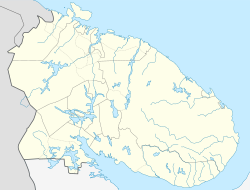Teriberka
| Teriberka (in English) Териберка (Russian) |
|
|---|---|
| - Rural locality - Selo |
|
 View of Teriberka in 2016 |
|
 Location of Murmansk Oblast in Russia |
|
|
|
|
|
|
|
| Administrative status (as of 2010) | |
| Country | Russia |
| Federal subject | Murmansk Oblast |
| Administrative district | Kolsky District |
| Statistics | |
| Population (2010 Census) | 957 inhabitants |
| Time zone | MSK (UTC+03:00) |
| Postal code(s) | 184630 |
| Dialing code(s) | +7 81553 |
| on | |
Teriberka (Russian: Териберка) is a rural locality (a selo) in Kolsky District of Murmansk Oblast, Russia, located on the Barents Sea coast, at the mouth of the Teriberka River.
As a settlement, Teriberka was first mentioned approximately in 1523. Eyewitnesses from that time period confirmed the appearance of permanent Russian settlers. However, according to other sources, it was founded in the 1860s—the decade when the Murman coast was actively being settled.
By the end of 19th century, it was well-developed: having a church, a lighthouse, and a weather station (the first one on the Murmansk coast).
Names of the geographical features of the area, such as Cape Deploranskogo, Zavalishina Lip, and others relate to the Peter's Great expedition.
In the beginning of the 20th century, Teriberka had well-developed cod and shark fishing businesses (undertaken mostly by the Norwegians who owned a factory and a store). By the end of the 1920s, the first collective farm was organized in the village; it included a dairy farm and a reindeer herd in addition to the fishing boats.
Before World War II, fishermen and dairy farm workers of the collective farm were honored several times for their achievements and were sent to the VDNKh in Moscow. A shipyard construction in the village of Lyudeyny started around the same time.
Teriberka developed quickly after the war. In the 1940s–1960s, there were two fishing farms, two dairy farms, a poultry farm, a 2000-head reindeer herd, an American mink breeding farm, and two fish processing facilities in the village, as well as shops and warehouses of the White Sea base of Goslov (a government-sponsored organization of skilled workers). Repair facilities of the shipyard were working at their full capacity and were being expanded. Active construction of housing and public organizations was underway. The village had a stadium, a community center, workers' clubs of the shipyard, a fish processing facility, a Young Pioneers club, two schools (elementary and secondary), a boarding school for children from the coastal settlements, one inpatient and one outpatient hospital, and an ambulance station.
...
Wikipedia

